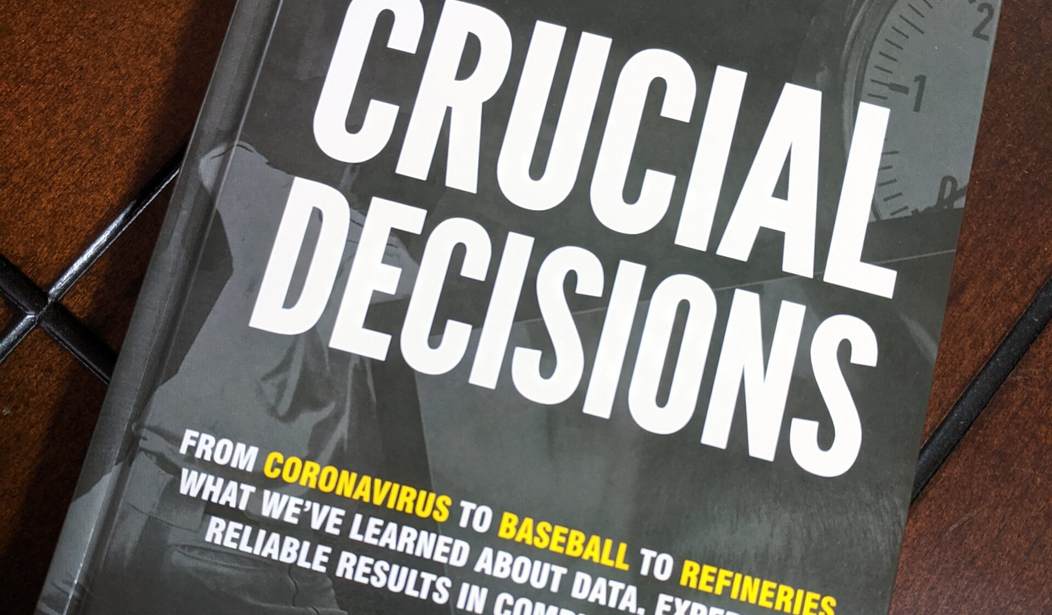“Two weeks to bend the curve.”
Remember that?
A year later, the president calls Texas “Neanderthal” for reopening its economy and mask mandates remain the pseudo law of the land. We have spent trillions on stimulus by printing magic money with no, and I mean no, thought of how it will ever be paid off. California may reopen, at some point, depending on what polls tell Gov. Gavin Newsom.
Are leaders making any decisions based on data, analysis, and clear thinking? Are they leading or gaslighting?
If real life was like a video game, we would have a “save point” to go back to and fix the past year. But we don’t. States remain locked down, the nation is disfigured and divided, debt is piling up, and inflation lurks over the horizon.
What could we have done differently? What if we had made different choices, based on data and clear thinking instead of politics and emotion?
As the pandemic was sweeping across the world, Ryan Sitton was tracking massive amounts of data and using it to ask the hard questions.
The result of that work is his first book, Crucial Decisions: From Coronavirus to Baseball to Refineries…What We’ve Learned About Data, Experts, and Reliable Results in Complex Situations.
Before I go further into the review, I should note a couple of things. I know Ryan and worked for him for two years. He’s a good man, a clear thinker, and one of the smartest people I’ve ever met. I also helped edit the first draft of this book but have no financial stake in it. Passing the one-year point of “two weeks to bend the curve” marks the perfect opportunity to discuss this book.
That first draft and the finished product are both brisk reads in which Sitton marshals data and clearly analyzes it as very few others can. He has an engineer’s mind. Data is his background; he’s the founder and CEO of Pinnacle, an engineering reliability firm built on big data and using it to predict (and prevent) failure in oil refineries. He brought data analysis to his role as Texas Railroad Commissioner, where he served as a regulator of energy development in the nation’s leading energy-producing state. He eats, sleeps, and drinks data with an eye toward making complex machines and systems more reliable. Reliability is ultimately one of the things we crave the most. We want reliable partners. We want reliable cars, which is why Toyota sells millions of them. We want the lights to come on when we flip the switch. We want computers that do what we need, and we want leaders who won’t exploit or lie to us.
In Crucial Decisions, he brings his towering analytical skills to bear on what decisions were made during the rise of COVID and what some of the alternatives were. He also hits on everything from baseball to education to risk analysis.
But this book isn’t just about data and decisions. It’s also about motivations and manipulations. Fear, Sitton writes, is one tool leaders used (and continue to use) to push us in the directions they want us to go — but not necessarily the best directions for us, our families, or our country. Chapter 5 deals with human motivation and a fundamental problem we have in today’s complex world: We need experts. But do we have the right experts, and did we have the right ones leading policy during COVID? Do we have experts we can trust to look at the correct data and assess the proper risks? Do our experts know and acknowledge that they have gaps in their knowledge and experience?
Dr. Anthony Fauci comes in for scrutiny here in questions the media has never asked. Simply, was Dr. Fauci the right expert for this moment? Here, Crucial Decisions gets to the point. Fauci knows a great deal about treating many diseases but is not well-versed in the spread of any disease.
That makes all the difference. We see it now when Dr. Fauci is flummoxed about why Texas, which has reopened and dropped its mask mandate, sees its COVID case numbers keep decreasing. Disease, he understands. The spread of disease, perhaps not — according to his own official bio.
Doesn’t that make a world of difference in a viral plague?
It certainly makes a difference when assessing the impacts of government decisions such as shutting whole economies down and spending borrowed money on stimulus checks. Dr. Fauci isn’t an economist. Hardly anyone at the helm of states that remain locked down has any economics background.
The single most important thing most so-called experts failed to do was amass and assess data and determine the risks of taking one path versus another. Sitton touches on and returns to this theme several times over the course of Crucial Decisions. He brings his analysis to bear to examine education policy, predict the hiring process of the future, and also look back at the year we lost to COVID. Spoiler: The higher education bubble is very real.
Crucial Decisions should be to COVID what Moneyball was to sports analysis a few years ago. It’s a brisk read that dives very deep into big data without ever losing its ability to entertain. Ryan Sitton was in politics, and he may be again at some point, but Crucial Decisions isn’t a politician’s book at all. It’s the book of a leader who brings data to bear and thinks clearly in a crisis and through the crucial decisions facing us all.
‘Fool’s Errand’ Delivers a High-Stakes Mafia Thriller Wrapped in a Tale of Fathers and Sons
Spoiler-Free Review: Godzilla vs. Kong Proves Movies Can Still Be Fun









Join the conversation as a VIP Member